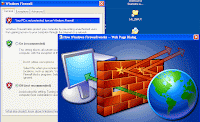How to
protect our computers from viruses
Use a Firewall
You should also install firewall .A firewall is a system that prevents unauthorized use and access to your computer. A firewall can be either hardware or software. Hardware firewalls provide a strong degree of protection from most forms of attack coming from the outside world and can be purchased as a stand-alone product or in broadband routers. Unfortunately, when battling viruses, worms and Trojans, a hardware firewall may be less effective than a software firewall, as it could possibly ignore embedded worms in outgoing e-mails and see this as regular network traffic.
For individual home users, the
most popular firewall choice is a software firewall. A good software
firewall will protect your computer from outside attempts to control or gain
access your computer, and usually provides additional protection against the
most common Trojan programs or e-mail worms. The downside to software
firewalls is that they will only protect the computer they are installed on,
not a network.
It is important to remember that
on its own a firewall is not going to rid you of your computer virus problems,
but when used in conjunction with regular operating system updates and a good
anti-virus scanning software, it will add some extra security and protection
for your computer or network.
17% of internet users surf the web without any antivirus software. In the United States that number is closer to 20%. And all of these users are just waiting to become zombies. We should follow the Finnish example—only 7% of Finns surf unprotected.
Antivirus software
Antivirus software
Antivirus or anti-virus
software is software used to prevent, detect and remove malware (of all descriptions), such as: computer viruses, malicious BHOs, hijackers, ransom ware , key loggers, backdoors, root kits, Trojan horses, worms, malicious LSPs, dialers, fraudtools, adware and spyware. Computer security, including
protection from social engineering
techniques, is commonly offered in products and services of antivirus software
companies. This page discusses the software used for the prevention and removal
of malware threats, rather than
computer security implemented by software methods.
A variety of strategies are
typically employed. Signature-based detection involves searching for known
patterns of data within executable
code. However, it is possible for a computer to be infected with new malware
for which no signature is yet known. To counter such so-called zero-day threats, heuristics can be used. One type of heuristic
approach, generic signatures, can identify new viruses or variants of existing
viruses by looking for known malicious code, or slight variations of such code,
in files. Some antivirus software can also predict what a file will do by
running it in a sandbox and analyzing what it does to see if
it performs any malicious actions.
No matter how useful antivirus
software can be, it can sometimes have drawbacks. Antivirus software can impair
a computer's performance.
Inexperienced users may also have problems understanding the prompts and
decisions that antivirus software presents them with. An incorrect decision may
lead to a security breach. If the antivirus software employs heuristic
detection, success depends on achieving the right balance between false positives and false
negatives. False positives can be as destructive as false negatives. Finally, antivirus software generally
runs at the highly trusted kernel level of the operating system, creating a potential
avenue of attac



.jpg)

Nice and useful information
ReplyDelete